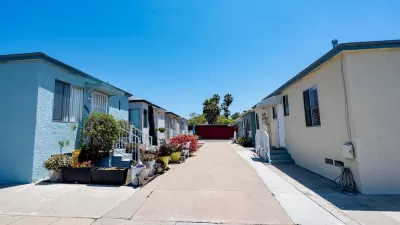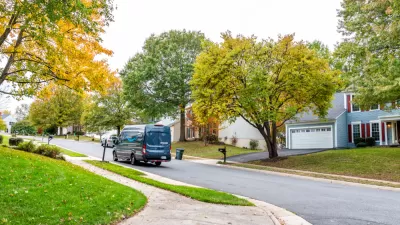The Orange County beachfront community has had enough of the California State Legislature’s preemption of local zoning laws.

The newest front in the battle over local control in California can be found in Huntington Beach, Orange County, where city officials have stopped permitting accessory dwelling units and are considering a legal challenge against state-mandated residential density.
Huntington Beach is a relatively conservative city in a state famous, whether fairly or not, for liberal politics. Huntington Beach attracted attention during the height of the pandemic in late fall 2020, with large protests of the state’s stay-at-home orders and curfew. The protests and adjacent episodes earned the city the nickname ‘Angrytown, USA’ from the Los Angeles Times.
Fast forward to the city’s most recent election, in November 2022, when voters elected a strongly conservative city council majority. According to an article by Jill Replogle for LAist, “The new council promptly vowed to fight state laws and mandates that overrule city zoning rules and would force it to allow more dense housing developments.”
According to Replogle, the Huntington Beach City Council will vote soon whether or not to mount a legal challenge to SB 9 and SB 10, two statewide housing laws approved in 2021, intended to spur housing production by loosening local zoning controls. Four cities located to the north in Los Angeles County—Redondo Beach, Torrance, Carson, and Whittier—announced a similar lawsuit to challenge SB 9 in April 2022.
“Huntington Beach is already considering adopting a rule that would exempt it from the state ‘builder's remedy,’ which allows developers to bypass local zoning if a city lacks an approved housing plan,” reports Replogle.
The City Council voted at the same meeting on February 21 to cease permitting of accessory dwelling units—residential developments allowed by several rounds of state law, including laws approved by the State Legislature in 2019 and 2016.
FULL STORY: Huntington Beach Wants To Take On California Over Duplexes, ADUs

Study: Maui’s Plan to Convert Vacation Rentals to Long-Term Housing Could Cause Nearly $1 Billion Economic Loss
The plan would reduce visitor accommodation by 25,% resulting in 1,900 jobs lost.

Alabama: Trump Terminates Settlements for Black Communities Harmed By Raw Sewage
Trump deemed the landmark civil rights agreement “illegal DEI and environmental justice policy.”

Why Should We Subsidize Public Transportation?
Many public transit agencies face financial stress due to rising costs, declining fare revenue, and declining subsidies. Transit advocates must provide a strong business case for increasing public transit funding.

Paris Bike Boom Leads to Steep Drop in Air Pollution
The French city’s air quality has improved dramatically in the past 20 years, coinciding with a growth in cycling.

Why Housing Costs More to Build in California Than in Texas
Hard costs like labor and materials combined with ‘soft’ costs such as permitting make building in the San Francisco Bay Area almost three times as costly as in Texas cities.

San Diego County Sees a Rise in Urban Coyotes
San Diego County experiences a rise in urban coyotes, as sightings become prevalent throughout its urban neighbourhoods and surrounding areas.
Urban Design for Planners 1: Software Tools
This six-course series explores essential urban design concepts using open source software and equips planners with the tools they need to participate fully in the urban design process.
Planning for Universal Design
Learn the tools for implementing Universal Design in planning regulations.
Smith Gee Studio
Alamo Area Metropolitan Planning Organization
City of Santa Clarita
Institute for Housing and Urban Development Studies (IHS)
City of Grandview
Harvard GSD Executive Education
Toledo-Lucas County Plan Commissions
Salt Lake City
NYU Wagner Graduate School of Public Service





























